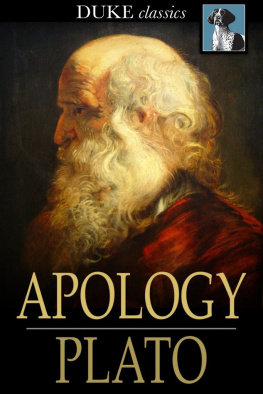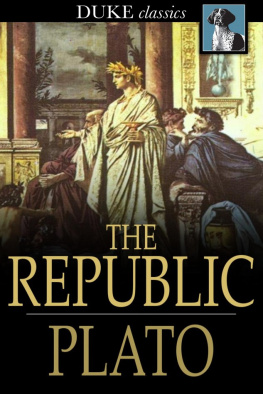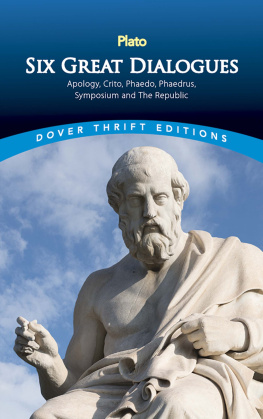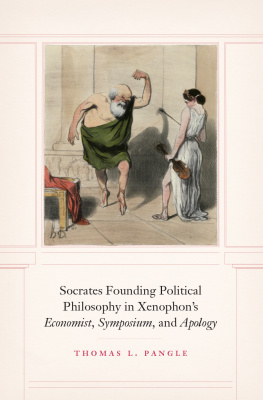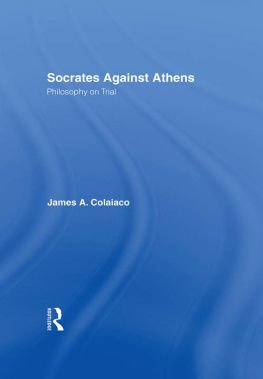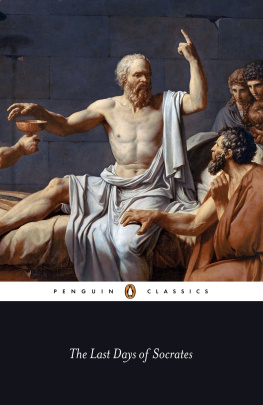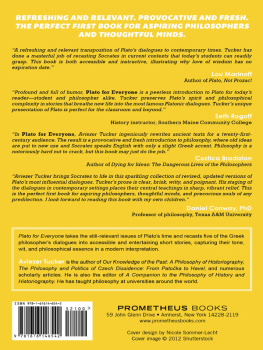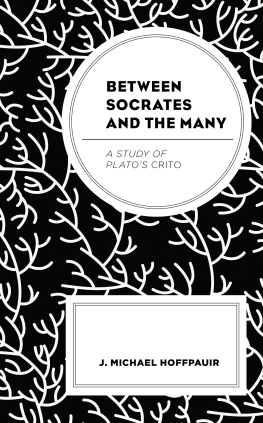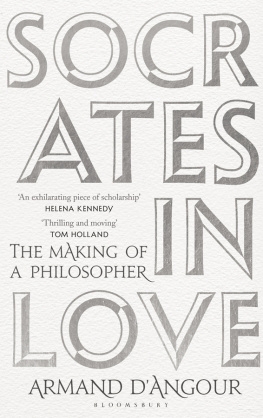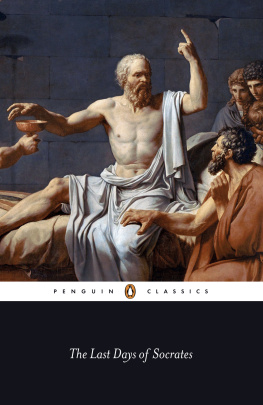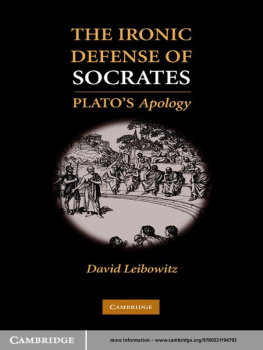APOLOGY
* * *
PLATO
Translated by
BENJAMIN JOWETT
*
Apology
ISBN 978-1-62012-022-4
Duke Classics
2012 Duke Classics and its licensors. All rights reserved.
While every effort has been used to ensure the accuracy and reliability of the information contained in this edition, Duke Classics does not assume liability or responsibility for any errors or omissions in this book. Duke Classics does not accept responsibility for loss suffered as a result of reliance upon the accuracy or currency of information contained in this book.
Contents
*
Introduction
*
In what relation the Apology of Plato stands to the real defence ofSocrates, there are no means of determining. It certainly agrees intone and character with the description of Xenophon, who says in theMemorabilia that Socrates might have been acquitted 'if in any moderatedegree he would have conciliated the favour of the dicasts;' and whoinforms us in another passage, on the testimony of Hermogenes, thefriend of Socrates, that he had no wish to live; and that the divinesign refused to allow him to prepare a defence, and also that Socrateshimself declared this to be unnecessary, on the ground that all his lifelong he had been preparing against that hour. For the speech breathesthroughout a spirit of defiance, (ut non supplex aut reus sed magisteraut dominus videretur esse judicum', Cic. de Orat.); and the loose anddesultory style is an imitation of the 'accustomed manner' inwhich Socrates spoke in 'the agora and among the tables of themoney-changers.' The allusion in the Crito may, perhaps, be adduced as afurther evidence of the literal accuracy of some parts. But in themain it must be regarded as the ideal of Socrates, according to Plato'sconception of him, appearing in the greatest and most public scene ofhis life, and in the height of his triumph, when he is weakest, and yethis mastery over mankind is greatest, and his habitual irony acquires anew meaning and a sort of tragic pathos in the face of death. The factsof his life are summed up, and the features of his character are broughtout as if by accident in the course of the defence. The conversationalmanner, the seeming want of arrangement, the ironical simplicity, arefound to result in a perfect work of art, which is the portrait ofSocrates.
Yet some of the topics may have been actually used by Socrates; andthe recollection of his very words may have rung in the ears of hisdisciple. The Apology of Plato may be compared generally with thosespeeches of Thucydides in which he has embodied his conception of thelofty character and policy of the great Pericles, and which at the sametime furnish a commentary on the situation of affairs from the point ofview of the historian. So in the Apology there is an ideal rather than aliteral truth; much is said which was not said, and is only Plato's viewof the situation. Plato was not, like Xenophon, a chronicler of facts;he does not appear in any of his writings to have aimed at literalaccuracy. He is not therefore to be supplemented from the Memorabiliaand Symposium of Xenophon, who belongs to an entirely different class ofwriters. The Apology of Plato is not the report of what Socrates said,but an elaborate composition, quite as much so in fact as one of theDialogues. And we may perhaps even indulge in the fancy that the actualdefence of Socrates was as much greater than the Platonic defence as themaster was greater than the disciple. But in any case, some of the wordsused by him must have been remembered, and some of the facts recordedmust have actually occurred. It is significant that Plato is said tohave been present at the defence (Apol.), as he is also said to havebeen absent at the last scene in the Phaedo. Is it fanciful to supposethat he meant to give the stamp of authenticity to the one and not tothe other?especially when we consider that these two passages are theonly ones in which Plato makes mention of himself. The circumstance thatPlato was to be one of his sureties for the payment of the fine which heproposed has the appearance of truth. More suspicious is the statementthat Socrates received the first impulse to his favourite calling ofcross-examining the world from the Oracle of Delphi; for he must alreadyhave been famous before Chaerephon went to consult the Oracle (Riddell),and the story is of a kind which is very likely to have been invented.On the whole we arrive at the conclusion that the Apology is true to thecharacter of Socrates, but we cannot show that any single sentence in itwas actually spoken by him. It breathes the spirit of Socrates, but hasbeen cast anew in the mould of Plato.
There is not much in the other Dialogues which can be compared with theApology. The same recollection of his master may have been presentto the mind of Plato when depicting the sufferings of the Just in theRepublic. The Crito may also be regarded as a sort of appendage to theApology, in which Socrates, who has defied the judges, is neverthelessrepresented as scrupulously obedient to the laws. The idealizationof the sufferer is carried still further in the Gorgias, in which thethesis is maintained, that 'to suffer is better than to do evil;' andthe art of rhetoric is described as only useful for the purpose ofself-accusation. The parallelisms which occur in the so-called Apologyof Xenophon are not worth noticing, because the writing in which theyare contained is manifestly spurious. The statements of the Memorabiliarespecting the trial and death of Socrates agree generally with Plato;but they have lost the flavour of Socratic irony in the narrative ofXenophon.
The Apology or Platonic defence of Socrates is divided into threeparts: 1st. The defence properly so called; 2nd. The shorter address inmitigation of the penalty; 3rd. The last words of prophetic rebuke andexhortation.
The first part commences with an apology for his colloquial style;he is, as he has always been, the enemy of rhetoric, and knows ofno rhetoric but truth; he will not falsify his character by making aspeech. Then he proceeds to divide his accusers into two classes; first,there is the nameless accuserpublic opinion. All the world from theirearliest years had heard that he was a corrupter of youth, and had seenhim caricatured in the Clouds of Aristophanes. Secondly, there arethe professed accusers, who are but the mouth-piece of the others. Theaccusations of both might be summed up in a formula. The first say,'Socrates is an evil-doer and a curious person, searching into thingsunder the earth and above the heaven; and making the worse appear thebetter cause, and teaching all this to others.' The second, 'Socrates isan evil-doer and corrupter of the youth, who does not receive the godswhom the state receives, but introduces other new divinities.' Theselast words appear to have been the actual indictment (compare Xen.Mem.); and the previous formula, which is a summary of public opinion,assumes the same legal style.
The answer begins by clearing up a confusion. In the representationsof the Comic poets, and in the opinion of the multitude, he had beenidentified with the teachers of physical science and with the Sophists.But this was an error. For both of them he professes a respect in theopen court, which contrasts with his manner of speaking about them inother places. (Compare for Anaxagoras, Phaedo, Laws; for the Sophists,Meno, Republic, Tim., Theaet., Soph., etc.) But at the same timehe shows that he is not one of them. Of natural philosophy he knowsnothing; not that he despises such pursuits, but the fact is that he isignorant of them, and never says a word about them. Nor is he paid forgiving instructionthat is another mistaken notion:he has nothing toteach. But he commends Evenus for teaching virtue at such a 'moderate'rate as five minae. Something of the 'accustomed irony,' which mayperhaps be expected to sleep in the ear of the multitude, is lurkinghere.

